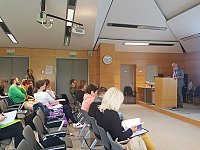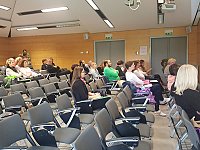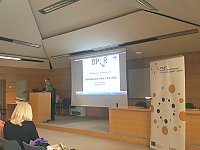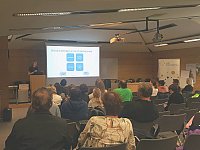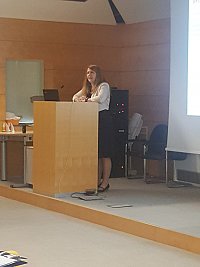31. 05. 2019 – 31. 05. 2019 | Ljubljana
On 31 May 2019 the National Institute for Public Health Slovenia (NIJZ) organized a Local Stakeholder Meeting in Ljubljana.
The meeting was attended by patient support organisations, Ministry of Health representative and representatives of other Joint Actions in the Third Health Programme.
At the start of the meeting, Assist. Prof. Tit Albreht, scientific coordinator of iPAAC JA at NIJZ presented iPAAC JA to gathered stakeholders. After successfully bringing to an end two Joint Actions EPAAC (European Partnership for Action Against Cancer) in CANCON (Cancer Control), NIJZ is again leading the third Joint Action in the field of cancer iPAAC (Innovative Partnership for Action Against Cancer). Assist. Prof. Albreht presented all the Work Packages and planned outputs of the JA, including the key deliverable of the JA Roadmap on Implementation and Sustainability of Cancer Control Actions. Assist. Prof. Albreht also pointed out the emphasis on the implementation of the results in current JA, underlining the importance of cooperation with local stakeholders.
The Institute of Oncology Ljubljana (OIL) is also an Associated Partner from Slovenia in the JA. The Head of the cancer screening department at the OIL and Head of ZORA – National screening programme for Cervical Cancer, Urška Ivanuš, MD Phd, presented their participation in iPAAC JA Work Packages. She detailed the work on WP 5 (Cancer Prevention). In Slovenia, we have three well established national screening programmes yielding much success – ZORA – National screening programme for Cervical Cancer halved the incidence of cervix cancer, SVIT Programme - National screening and early detection programme for colorectal cancer also successful in reducing the incidence of colorectal cancer at the population level and Breast Cancer Screening Programme, called DORA, successful in detecting cancer at early stages, when treatment is less intense and survival rates higher. In the frame of iPAAC JA the success of screening programmes in Slovenia can be used as an example for implementation of screening programmes in other Member States.
Assist. Prof. Mateja Krajc, presented OIL activities in Work Package 6 (Genomics in cancer control and care) focused her presentation on genetic testing done at the OIL since 1999. In the iPAAC JA they are able to share their rich experience in genetic testing and help with stimulating a societal debate on ethical and legal issues of data privacy in managing genome data in healthcare. Assist. Prof. Krajc emphasised that commercial providers of genetic testing marketing directly to consumers need to ensure the adequate quality of healthcare before and after testing.
Prof. Vesna Zadnik, Head of the Slovene cancer registry voiced the collaboration of OIL in iPAAC JA Work Package 7 (Cancer information and registries). According to the Slovene National Cancer Plan 2017 – 2021 OIL will establish a system of continued collection and real time processing of expanded population data on patients with the most common cancers: lung, prostate, breast, colorectal and skin melanoma. In addition to already collected basic data (i.e. number of patients) they will include monitoring of the quality of care and treatment methods. As first of the planned clinical registries the Clinical registry of skin melanoma was introduced in 2017. It will serve as a model of good practice for other Member States in iPAAC JA.
Professor of ethics and philosophy of medicine from Ghent University, Ignaas Devisch gave a lecture on the changes in the meaning of solidarity as a basis for resolving health issues, concerning society. His presentation touched upon the new principles that will be needed to deal with cancer policy and ethical challenges in healthcare. Professor Devisch reviewed two principles, which were mainly the focus of his talk: solidarity and autonomy. Current ethical challenges have to deal with partnership and informing people, which pertains to the fact that people want to be informed and involved in the decisions regarding their healthcare. The presentation further reflected on the shifting futures of solidarity. It was stressed that as a society we will need to prevent discrimination against cancer survivors (e.g. taking the insurance or mortgage). Prof. Devisch emphasized that we should shift from core current principles of autonomy (being adequately informed, capacity to process information and absence of coercion or manipulation) to partnership, which means that patients should be as active partners in clinical research as possible.
Prof. Branko Zakotnik, Head of the National Cancer Control Programme in Slovenia helped us understand the main fields of challenges in cancer control in Slovenia. Prof. Zakotnik pointed out much has been done in the field of cancer control, but certain challenges remain unanswered. Key challenges in Slovenia remain: palliative care, analysis and planning accordingly in regard of expected incidence and treatment methods; comprehensive rehabilitation; establishing treatment methods and unifying information technologies. Unified information technologies are needed to actively manage the programme, follow the goals and monitor the success of the programme – all of these issues will be addressed in the frame of iPAAC JA.
In his concluding remarks, Assist. Prof. Tit Albreht called for increased cooperation with organisations working in the field of cancer control and invited them to join iPAAC JA as Collaborating partners. He pointed out iPAAC JA is striving first and foremost to implement sustainable measures in the field of cancer control.
Documents
- Agenda (PDF file, 600 kB)
Presentations
- Tit Albreht – iPAAC struktura in Roadmap
- Urška Ivanuš – Vloga Onkološkega inštituta Ljubljana v projektu skupnega ukrepa iPAAC
- Mateja Krajc – Work Package 6 – Genomics in Cancer Control and Care
- Vesna Zadnik – Participation of Slovenian Cancer Registry at iPAAC
- Ignaas Devisch – Ethical challenges of healthcare and cancer policy on solidarity and autonomy
Photo gallery
